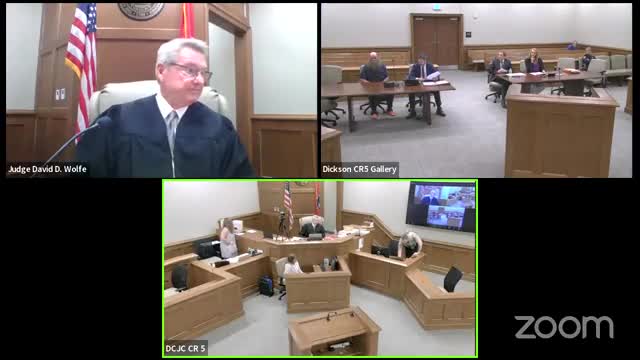Judge orders briefing after hearing on warrantless cell‑ping in Sheets case
September 26, 2025 | Judge David D. Wolfe State of Tennessee, Judicial, Tennessee
This article was created by AI summarizing key points discussed. AI makes mistakes, so for full details and context, please refer to the video of the full meeting. Please report any errors so we can fix them. Report an error »

A judge on Monday heard testimony in State v. Danny (Danny) Sheets on a motion to suppress location information obtained by law enforcement without a warrant. The hearing focused on whether officers had exigent circumstances to request a cell‑site location “ping” and whether the defendant — who was on probation at the time — has standing to challenge that procedure.
Officer Jessica Shope of the Dixon Police Department testified she contacted prosecutors and requested a phone‑location ping on Aug. 5 after the alleged victim, Christina Mateo, reported a call from Sheets and told officers he had previously shown up at her home despite a no‑contact condition. Shope said she believed Sheets posed a risk to the woman’s safety and that time was of the essence. The officer said central dispatch relayed coordinates (latitude/longitude with a radius, in meters) to law‑enforcement partners; Tennessee Highway Patrol and other agencies then acted on that information and took Sheets into custody.
Defense counsel argued the U.S. Supreme Court’s Carpenter v. United States decision protects an individual’s cell‑site location information (CSLI) under the Fourth Amendment and that, absent a warrant, the state must show an exception applies. Prosecutors defended the ping as legal under exigent‑circumstances and active‑pursuit exceptions and argued the defendant’s probation status diminished his privacy rights.
Officer Shope acknowledged she did not independently confirm whether a search warrant could have been obtained in the time available and said she acted quickly because the defendant had (1) an active warrant, (2) a pattern of returning to the alleged victim’s house after law‑enforcement warnings, and (3) an unknown location after contacts suggested he might be moving toward the victim. Shope also said she relayed the ping to local partners and that troopers executed an arrest and later obtained a search warrant for the vehicle; evidence seized after the arrest included the defendant’s phone, clothing and other items, she said.
Defense counsel argued the state had time to get a warrant while using patrols to protect the alleged victim. The defense also raised standing: because Sheets was on probation, his privacy interest may be diminished, and an argument over whether his probation order contained a waiver of the right to contest such searches could moot the suppression claim.
The judge ordered the parties to brief whether probation conditions or the probation order itself altered Sheets’s Fourth Amendment standing, and gave the defense 15 days to file, with 15 days for the state to respond. The court said it would rule after reviewing those filings.
Authorities discussed: the hearing referenced Carpenter v. United States and the Tennessee statutory framework governing searches and probation conditions. The judge reserved ruling pending the requested briefing and supporting authorities.
The hearing record will determine whether evidence seized after the ping, and any derivative evidence, is admissible at trial.
Officer Jessica Shope of the Dixon Police Department testified she contacted prosecutors and requested a phone‑location ping on Aug. 5 after the alleged victim, Christina Mateo, reported a call from Sheets and told officers he had previously shown up at her home despite a no‑contact condition. Shope said she believed Sheets posed a risk to the woman’s safety and that time was of the essence. The officer said central dispatch relayed coordinates (latitude/longitude with a radius, in meters) to law‑enforcement partners; Tennessee Highway Patrol and other agencies then acted on that information and took Sheets into custody.
Defense counsel argued the U.S. Supreme Court’s Carpenter v. United States decision protects an individual’s cell‑site location information (CSLI) under the Fourth Amendment and that, absent a warrant, the state must show an exception applies. Prosecutors defended the ping as legal under exigent‑circumstances and active‑pursuit exceptions and argued the defendant’s probation status diminished his privacy rights.
Officer Shope acknowledged she did not independently confirm whether a search warrant could have been obtained in the time available and said she acted quickly because the defendant had (1) an active warrant, (2) a pattern of returning to the alleged victim’s house after law‑enforcement warnings, and (3) an unknown location after contacts suggested he might be moving toward the victim. Shope also said she relayed the ping to local partners and that troopers executed an arrest and later obtained a search warrant for the vehicle; evidence seized after the arrest included the defendant’s phone, clothing and other items, she said.
Defense counsel argued the state had time to get a warrant while using patrols to protect the alleged victim. The defense also raised standing: because Sheets was on probation, his privacy interest may be diminished, and an argument over whether his probation order contained a waiver of the right to contest such searches could moot the suppression claim.
The judge ordered the parties to brief whether probation conditions or the probation order itself altered Sheets’s Fourth Amendment standing, and gave the defense 15 days to file, with 15 days for the state to respond. The court said it would rule after reviewing those filings.
Authorities discussed: the hearing referenced Carpenter v. United States and the Tennessee statutory framework governing searches and probation conditions. The judge reserved ruling pending the requested briefing and supporting authorities.
The hearing record will determine whether evidence seized after the ping, and any derivative evidence, is admissible at trial.
View full meeting
This article is based on a recent meeting—watch the full video and explore the complete transcript for deeper insights into the discussion.
View full meeting
